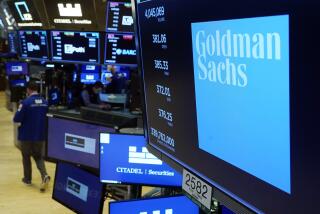Goldman is targeted in U.S. probes
- Share via
NEW YORK — Goldman Sachs Group’s famously gold-plated bonuses are coming with a little something extra this year: unwanted scrutiny from the government.
Just a few weeks after reporting record quarterly profit and a bonus kitty of more than $11 billion, Goldman revealed in a government filing that “various governmental agencies” were looking into how the firm gave out compensation.
The company declined to reveal Wednesday which agencies were examining its pay practices and wouldn’t provide details. Goldman also said it had received government inquiries about its credit-derivatives business, another hot-button issue, and that it was cooperating with both inquiries.
Some regulators and lawmakers are perturbed that institutions that received government assistance during the financial crisis have turned around so soon after repaying the aid to uncork huge bonuses.
Goldman received $10 billion from the federal government’s Troubled Asset Relief Program last year. And even though it repaid the money plus dividends this year, critics have held up Goldman as a symbol of Wall Street greed.
“It raises suspicion when we’re talking about so much money coming directly [after] a firm bailout by taxpayers,” said Richard Ferlauto, head of corporate governance at the American Federation of State, County and Municipal Employees.
“You can’t say, ‘We’re off the dole now. We deserve as much money as we can generate through our bonus pool.’ ”
In a sign of Goldman’s newfound place in the public consciousness, two national non-business magazines recently devoted lengthy stories to Goldman, and one, New York magazine, asked whether the firm was “evil.”
A published report Tuesday said Goldman’s chief executive had instructed employees to mute their conspicuous consumption for fear of whipping up additional public scorn.
“They’ve become a lightning rod for all that [critics say] is wrong with Wall Street compensation even though they’re extremely successful and profitable,” said Jim Reda, founder of James F. Reda & Associates, a New York compensation consulting firm.
Goldman last month reported record quarterly earnings of $3.4 billion in the second quarter and has squirreled away $11.4 billion so far this year to pay bonuses. At that pace, Goldman could distribute an average of $770,000 this year to each of its nearly 30,000 employees.
The New York attorney general’s office said last week that Goldman ladled out $4.8 billion in bonuses last year, providing 953 people with at least $1 million each.
Goldman disclosed in a filing Wednesday with the Securities and Exchange Commission that it had “received inquiries from various governmental agencies and self-regulatory organizations regarding the firm’s compensation processes” as well as “credit derivative instruments,” essentially securities based on underlying assets.
A Goldman Sachs spokesman declined to comment, as did the SEC and the Financial Industry Regulatory Authority.
The spotlight on Goldman is part of broader concern that the lure of outsize bonuses prodded Wall Street bankers and traders to take outlandish risks that later went awry. Critics worry that Goldman and other firms are still taking excessive risks that could backfire.
In an indication of the huge amounts of money at stake, Goldman disclosed in the SEC filing that its daily trading revenue topped $100 million on 46 days last quarter.
Goldman is heavily involved in credit derivatives, which caused deep losses at some firms during the financial crisis.
The Justice Department is investigating a company jointly owned by Goldman Sachs and other top Wall Street firms that acts as a clearinghouse in the giant credit-default-swap market, according to published reports.
The derivatives inquiry is notable because Goldman benefited from the government bailout of troubled insurer American International Group Inc.
AIG had essentially insured Goldman’s credit-derivative trades, and Goldman could have suffered losses had AIG defaulted on its obligations, according to experts.
--
More to Read
Inside the business of entertainment
The Wide Shot brings you news, analysis and insights on everything from streaming wars to production — and what it all means for the future.
You may occasionally receive promotional content from the Los Angeles Times.










